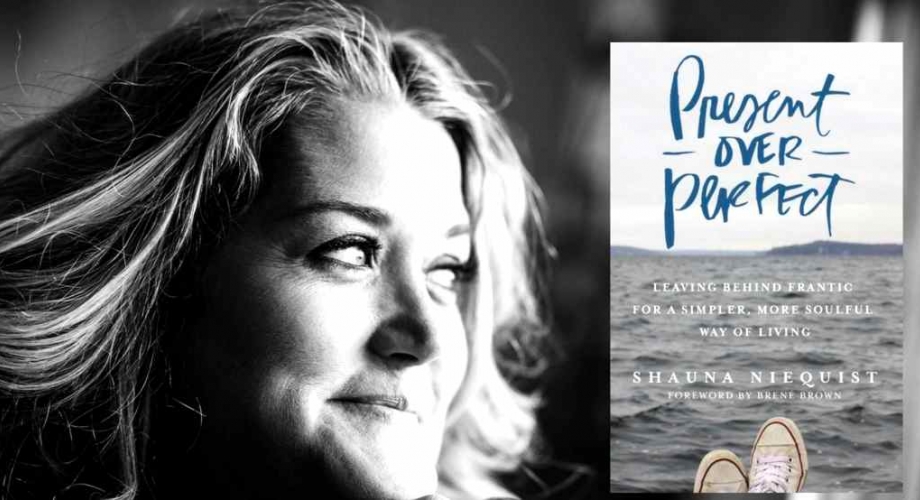
Present Over Perfect
After finding herself exhausted, isolated, and sick, author Shauna Niequist came to a point where she knew her life had to change. She was tired, burnt out, and felt unconnected to the people she loved.
Her new book, Present Over Perfect: Leaving Behind Frantic for a Simpler, More Soulful Way of Living, chronicles her transition from a life of striving for perfection to rediscovering her created purpose and living from a place of meaning and connection. With her warm, vulnerable voice, she tells of how she underwent the most important transformation of her life, while also inviting us to do the same.
She writes, “This book is an account of my winding, messy journey from exhaustion to peace, from isolation to connection, from hustling and multitasking to sacred presence.”
We chatted with Shauna about the impact Present Over Perfect has had on her life, where she finds rest, and how we can learn to live more simple, soulful lives, too.
❥ What was going on in your life when you decided to write Present Over Perfect?
I hit a point in my mid-thirties when I realized that there were all these words I wanted my life to be: connected, warm, spontaneous, meaningful, graceful, rest-filled - but my actual life was rushed and frantic and isolated and exhausted. My work schedule and responsibilities were ruling my life. I was an extremely busy, productive person, but I wasn’t the friend, the wife, or the parent I wanted to be, and I realized that the trade-off wasn’t worth it. It just didn’t matter to me anymore that people thought I was very responsible and very capable; I wanted to reclaim a life of connection and play and rest.
❥ Since learning to rest, what changes have you seen in yourself and in your relationships?
I hope that if you spoke to my husband, my boys, and my closest girlfriends, they would say something like, “She’s back! She is present and with us in a way that she wasn’t for a while.” I don’t spend as much time with colleagues and publishing deadlines, and I spend a lot more time in my neighborhood and around my table. I got really close to losing my capacity to connect with the people I want to connect with and I’m really thankful to have walked back away from that ledge. If the people who are closest to me could be on the phone with us, they would say I’m different than I used to be, and that’s really important to me. This is not about a book or a story, but about a major life change.
❥ What practices and routines help keep you more grounded and present in your everyday living?
One thing that’s helped me is centering prayer. I write about it a lot in the book, but it continues to be a very anchoring, grounding practice for me. I begin the day just for a couple minutes picturing a red heart, and I focus my mind and my heart on God’s personal love for me. I remind myself that there’s nothing I can do today to earn more love, and there’s nothing I can do today to squander or ruin or break God’s love for me. When I start the day and end the day in that space, I find I’m very free throughout the day. I can try something really hard and fail. I can rest. I can take a risk because my worth is not on the line every step of the day; it’s already been decided by the God who created me. Knowing that helps me to live a freer, less fearful life.
❥ Having let go of the need to be seen as a “yes” person, where do you find your identity these days?
In terms of overall worth, I find that in having been created by God - just like every other person on the planet. My worth, or my value, comes from my createdness, in the same way that yours does, in the same way that every person’s does. In terms of identity and how I want to be known, it’s really important to me that the people closest to me experience me as a deeply kind and honest and brave and present person, and it’s increasingly less important to me what people I don’t know think of me.
Anytime you do anything remotely public, whether it’s blogging or writing or photography or whatever, it’s very easy to slip into this “campaign mode,” like you’re a politician on a campaign trail and you just want everyone to like you everywhere you go. At a certain point, though, I just hope my work helps people. I don’t need for every person I meet everywhere to love me. The love and affection I need is in our home, our neighborhood, and our closest friends and family. Beyond that, I want to be a helpful voice to other people, but I don’t need to be campaigning all the time.
❥ You talk about “fake rest” in the book. How is it different from true rest?
For me, fake resting is when everyone else in my house is legit resting - watching TV, playing a games, actually resting their minds, bodies, and just chilling - and I look like I am because I’m near them and I’m in my pajamas, but I’m actually still hustling, just on a different scale. I’m trying to get all the sheets changed, trying to get all the laundry done, trying to get all the dishes done, trying to get little kids’ closets cleaned. Then I look back at Saturday morning and think, “There we all were being so cozy and snuggly in our pajamas... so why am I exhausted?” I’m exhausted because I didn’t actually rest in any way! I just hustled more.
This isn’t necessarily about work-life balance, either, because a lot of time it’s not my work that’s wearing me out; it’s my life and the expectations I have for myself. A lot of us have rules for ourselves, whether never, ever missing a workout or never leaving dishes in the sink before you go to bed. These are what exhaust us, even if the work part of our life is under control. Those personal expectations for having to do everything at a particular level can be exhausting, and so I’m learning to let things be undone. Part of my work as a person is to consciously leave things undone in order to focus on other, more important things. I would rather invite people into the mess than keep them on the outside of my life any longer.
❥ What tips would you offer someone who wants to make a change in their life, but feels stuck in the cycle of busyness?
One of the things that really helped me at the beginning of this process was talking about it with the people I’m closest to. Telling others about your goals forces you to stick with them. When you start explaining to your best friend, for example, that you don’t want achievement and responsibility to be the most prevalent markers of your life anymore, and that you want to play more, rest more, and experience the beauty of the world in a deeper way, then she will lovingly put you back on path when she sees you not doing that.
I would also recommend surrounding yourself with people who are on a similar journey. There was one friend I had whose desire for perfection and achievement and efficiency made my own engine start running faster when I was with her. Everything seemed like it needed to get better and quicker and shinier. When I wanted to make these changes, I had to consciously adjust that relationship in my life. We’re totally still friends, but I had to make sure that the bulk of my relational time was not spent with someone who was going in a really different direction than me.
❥ What advice would you give your 20-year-old self?
In my mid-twenties I was building my career, so being known as a professional, responsible adult was really important to me. I look back now and wish I would’ve played more. I didn’t take advantage of the tremendous freedom that comes before you’re married and before you have kids. I don’t want to say that all the fun you could ever have is before you get married and have kids because that’s not true at all, but there is a certain amount of freedom with your time and with your schedule and with your money. Instead of enjoying that, I bought a house right away and got a job and worked a lot and tried to be very grown-up. Now that I am an actual grown-up, I realize that wasn’t necessary and I would’ve gotten there soon enough.
So my advice would be to invest really deeply in friendships. Make memories together. Take risks together. I lived like I was 40 when I was 25 and I wish I would have maybe started a little business or a magazine or maybe written fiction or maybe tried a couple of different jobs. I got locked into a pretty career-oriented, responsible path pretty early on and I wish I would have tried more things. I think that would have been really good for me and really fun.
Enjoy Shauna's other notable books!






